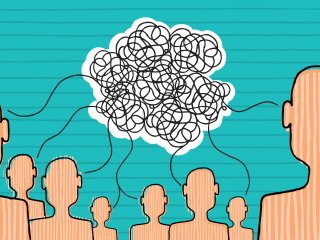Posted February 6th, 2019
By Kris Powers
Steven Covey once said, “Most people do not listen with the intent to understand, they listen with the intent to reply”.
We are a busy society that often resorts to multitasking to get through the items on our work or personal agenda. We think we are being successful, but how many times have we made a mistake because we didn’t fully understand the instructions? Or rushed through a conversation only to feel as if we didn’t give it our full attention in the moment? While doing two things at once can work for some tasks, it doesn’t work well when one of those tasks involves listening.
Listening isn’t just hearing someone speak. Too many times, we allow our attention to wander, or we are so busy formulating our reply in our own heads that we end up tuning out the speaker. Add to that the constant distraction of our cell phones; (“I need to check my email; did you see that Facebook post? I’ll just send a quick reply to that text”) and you can see why it’s difficult to give someone your full attention without mindfully setting out to do so. However, by not being fully present in the conversation, we risk losing out on so much. We might miss out on the opportunity to show empathy, understanding, offer compassion, and increase our knowledge.
Bernard Ferrari, author of Power Listening: Mastering the Most Critical Business Skill of All has been quoted as saying, "Good listeners seek to understand—and challenge—the assumptions that lie below the surface of every conversation."
Do you feel that your listening skills could use improvement? The good news is that listening is a skill; which means it is something that can be worked on and practiced. Here are some tips to put into practice the next time you are in a personal or professional conversation or setting:
- Show respect
Put aside your cell phone or other items that might be a distraction during the conversation (files, paperwork, laptop – you get the idea). Any items that can draw our attention away from the moment should be put out of reach. This shows the speaker that they have your full attention.
- Clear your mind
Oftentimes we enter a conversation assuming we know what the speaker will say or do. We’ve already started an internal dialogue with ourselves and it’s all too easy to drown out the actual conversation if we’re not careful. If we start every conversation by clearing our mind and preparing to learn something new, we allow ourselves to be fully present in that moment.
- Keep Quiet
Do you find that you are more concerned with being heard and voicing your own opinion, rather than fully listening to the speaker? Throughout the conversation, before opening your mouth, ask yourself if what you are going to say is going to contribute anything meaningful. Does it have a purpose other than to hear yourself speak? If not, keep quiet, sit back and keep listening to what the other person has to say.
- Summarize what you think you’ve heard
When appropriate, relay back to the speaker what you think you have heard them say. By summarizing what you’ve heard, it shows them that you’ve been attentive and gives them the opportunity to confirm or correct. It also will work to improve your memory of the conversation and the learnings that you can take away from it.
- Ask questions of the speaker
Ask open ended questions, questions that require more than a simple yes/no answer, to spark conversation and engage your communication skills. Not only are questions an invitation for the other person to keep talking, but it opens a two-way conversation (or more, if there are other participants) and can lead to a more engaging conversation and sharing of ideas. By asking open ended questions pertaining to what the speaker had just been talking about, you show that you were listening and that you are interested in additional learning.
- Watch your body language
Being an active listener involves the use of not only your ears. Your body language sends signals to the speaker. Make eye contact. This lets them know that you are fully vested in the conversation and shows that you respect them and what they are saying. Demonstrate that you are actively listening by nodding your head, smiling in agreement, or uttering small words of acknowledgement and encouragement like, “tell me more” or “you don’t say”. All of these signify your engagement in the conversation and keep your attention where it should be – on the speaker.
Listening takes practice. Whenever you have the opportunity, practice active listening and give more of your attention to the speaker. Throughout every conversation ask yourself, “am I being the best listener that I could be? Am I as fully present in this conversation as I’d like others to be, should I be the one speaking?” Use this self-assessment and adjust your behavior accordingly.
Active listening is a gift. Whether you put the above tips into practice in your professional and/or your personal life, you will notice the benefits! By being a better listener, you can teach others to listen better too. The more that we stop and fully engage in meaningful conversations, the better our relationships will be.
Ed4Career understands the importance of listening. We’ve listened to our students and schools and have created a robust catalog of career training and personal enrichment courses designed to meet learning needs.
Contact us today and let’s start a conversation about online education with Ed4Career. We promise we’ll listen!





